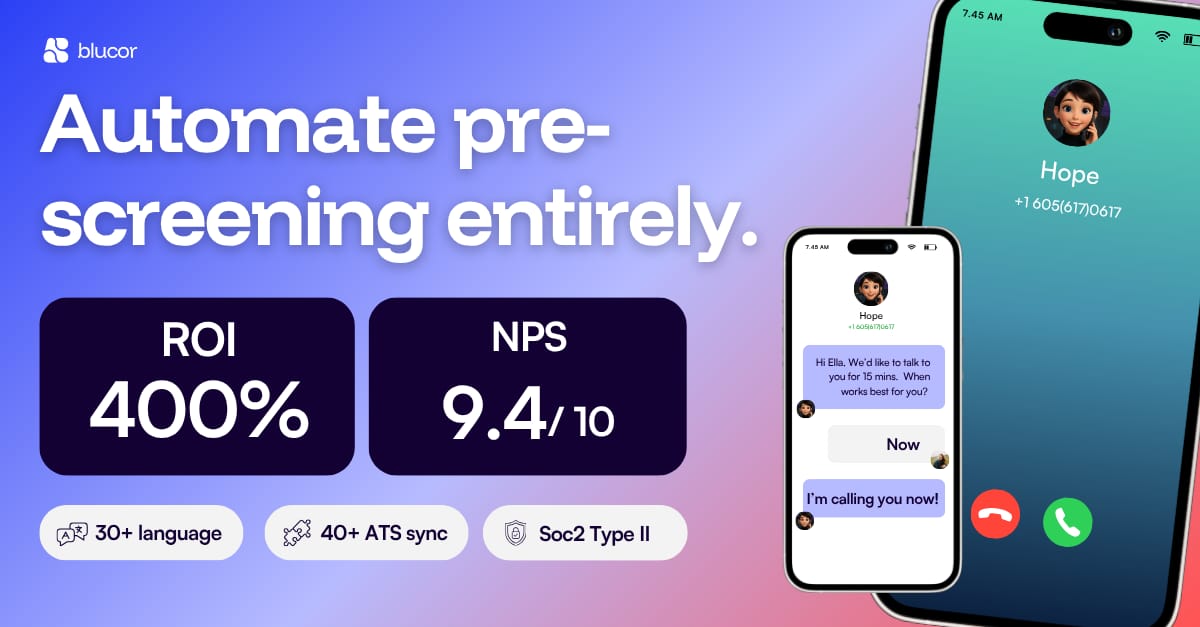- Blucor's Newsletter
- Posts
- The Future of AI Recruiting in Retail: What’s Next for the Digital Workforce
The Future of AI Recruiting in Retail: What’s Next for the Digital Workforce

Retail hiring is changing faster than store layouts. Over the next five years, AI recruiting will shift from a support tool to a strategic engine that drives how retailers attract, assess, and retain talent. Automation will cut repetitive work, predictive analytics will anticipate staffing needs, and conversational AI will create candidate experiences as personal as the shopping journey itself.
TL;DR:
AI recruiting is redefining retail hiring through predictive workforce planning, personalized candidate engagement, and integrated data strategies that connect labor demand with business performance.

Predictive Analytics Will Power Workforce Planning
Retail demand fluctuates by hour, season, and region. Predictive hiring models are turning those fluctuations into forecasts. By analyzing sales data, foot traffic, and turnover patterns, AI can project staffing needs weeks ahead.
We’ve seen this approach transform hiring for large employers in manufacturing and logistics, where BlancAI’s Voice AI Agent cut recruiting costs by 78% and saved over 100 hours of manual work each month. The same logic applies to retail. When hiring teams can see demand coming, they can plan shifts, training, and onboarding before the rush hits. That means fewer last-minute scrambles and better labor cost control.
Conversational AI Will Personalize Every Candidate Interaction
Retail candidates expect instant communication. Conversational AI delivers it. Instead of waiting days for a callback, applicants can complete phone interviews in minutes, in their preferred language, and receive immediate updates.
Our AI agent, Hope, already supports 30+ languages and handles pre-screening around the clock. She adapts tone and questions based on each role, creating a consistent yet human experience at scale. For retail, that means every candidate—whether applying for a cashier role or warehouse associate—feels heard and valued from the first interaction.
Data Integration Will Redefine Workforce Strategy
The next leap comes from connecting retail’s customer and workforce data. Imagine linking e-commerce trends with hiring analytics: if online orders surge in a region, AI could trigger local recruitment campaigns automatically.
Retailers are beginning to explore this kind of integration, combining store performance, logistics, and staffing data into unified dashboards. Over time, this will evolve into a single workforce intelligence layer that helps leaders balance in-store and digital labor needs, manage multilingual teams, and plan for emerging roles like virtual store associates or AI operations managers.
Here’s a snapshot of how leading retailers are already using AI recruiting tools, based on data from the National Retail Federation (NRF) 2024 Workforce Report and Deloitte’s 2025 Retail Industry Outlook:
AI Recruiting Use Case | % of Retailers Implementing | Reported Impact |
|---|---|---|
Predictive scheduling and workforce forecasting | 46% | 12–18% reduction in overtime costs |
Conversational AI for candidate screening | 39% | 30–50% faster time-to-hire |
AI-driven diversity and bias monitoring | 28% | 22% improvement in candidate satisfaction |
Cross-border hiring automation | 17% | 15% lower cost per hire |
Sources: National Retail Federation, “Retail Workforce Trends 2024”; Deloitte, “Retail Industry Outlook 2025.”
Outlook: The Omnichannel Workforce
By 2030, retail hiring will operate like supply chain management—dynamic, data-driven, and borderless. Recruiters will shift from manual screening to strategic oversight, supported by AI agents that handle volume and complexity with precision.
Retailers that invest early in AI recruiting readiness will gain more than efficiency. They’ll build a workforce strategy that’s predictive, personalized, and resilient—ready for whatever the next retail cycle brings.
Call to action:
Start with a simple audit of your current hiring flow. Identify where automation can save time, where data can guide decisions, and where AI can create a better candidate experience. Then take the next step: book a demo to see how AI recruiting can future-proof your retail workforce.